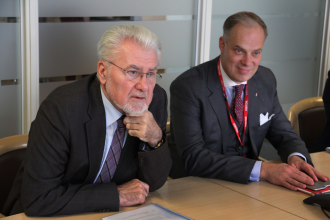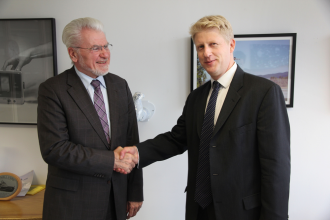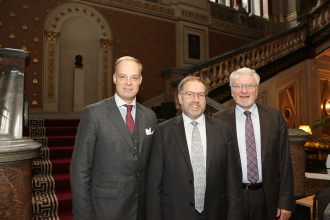The former President of the Hungarian Academy of Sciences (HAS) was received, among others, by Jo Johnson, Minister of State for Universities, Science, Research and Innovation, Sir Mark Walport, Government Chief Scientific Adviser to the British Prime Minister Theresa May, Stephen Metcalfe, Chair of the Science and Technology Committee (House of Commons), Robin Grimes, Chief Scientific Adviser to Foreign Secretary Boris Johnson and Sharon Ellis, Director of Business Innovation (BEIS).
An agreement was concluded with Sharon Ellis to ensure the British government’s assistance in realizing cooperation with British institutions that may be interested in the facilities of the ELI laser laboratory for instance, said József Pálinkás to MTI Hungarian news agency further to his discussions. London would also help arrange negotiations on such cooperation agreements, added the President of the NRDI Office.
As József Pálinkás shared, this concern was raised on the agenda of all his meetings in London, and the next six months would prove decisive in terms of concrete agreements to be concluded. In response to a query about his experiences during these meetings as to the possible impact of Brexit, i.e. Britain’s withdrawal from the European Union, on the scientific collaboration with Britain he said: through the following two years cooperation would be carried on within the existing frames, yet the Hungarian party urged early talks to keep the Hungarian-British scientific links strong, whatever forms the British exit would happen to take.
Both Hungarian and British negotiating parties agreed that the relations between research organisations and universities of the two countries could strengthen in the future instead of declining. “In my view Brexit will bring no tie-up whatsoever in the scientific relationships” Pálinkás added. He also emphasised: if the strength of such relations is seen through the number of Hungarian students studying at European universities, Britain proves to be our strongest partner. On his meetings it was also discussed how Hungarian students at British universities could be better connected to Hungary and how they could be integrated into the British-Hungarian scientific collaboration. Even the next few months may bring specific actions to that end, the President of the NRDI Office said. Among the possibilities he mentioned that Hungarians studying in England would be eager to take part in summer traineeships in Hungary. Students involved in Hungarian traineeships would be much more likely to participate in research programmes with Hungarian organisations, emphasised József Pálinkás as a serious benefit from such initiatives.









